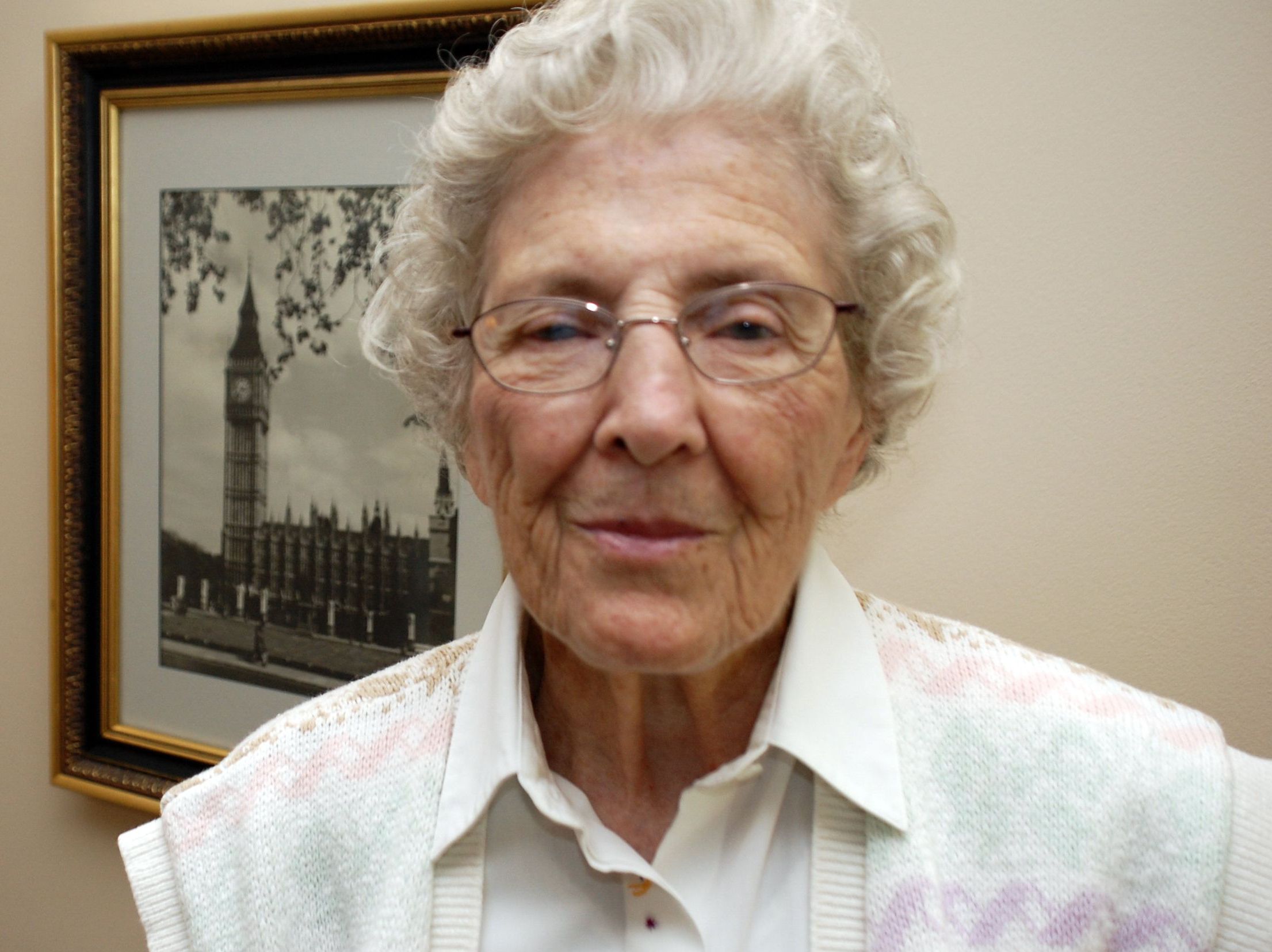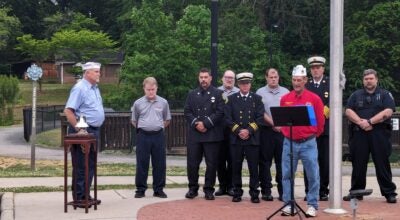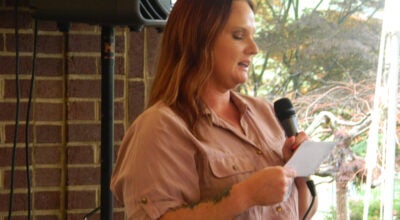Oh-So-Secret: Pauline Leab Shuping lived life of espionage in WWII
Published 12:00 am Saturday, May 24, 2014
SALISBURY — As her boyfriend and future husband Ransom Shuping rumbled in tanks across Europe with the 2nd Armored Division, Pauline Leab relied on the decoded intelligence she was typing up daily to track his progress.
“I knew more what was happening to him than he did,” Shuping says now of her late husband, to whom she was married for 65 years. “I knew where his outfit was.”
A country girl from Barber Junction, Pauline Leab Shuping found herself injected into the middle of World War II’s espionage and intrigue from a London office of the OSS — Office of Strategic Services.
“We called it ‘Oh-So-Secret,’ ” Shuping says today from her home in Westcliffe.
The OSS, a forerunner to the post-war establishment of the Central Intelligence Agency, specialized in guerilla warfare by dropping operatives behind enemy lines. Those operatives collected information about the enemy’s fighting power and troop movements and sent it back by code to OSS offices such as the one in London.
The OSS had other types of spies, and Shuping, an avid reader of this facet of the war, says they included women such as the famous cook Julia Child, a source in Paris, and a one-legged “lady of the night.”
Whatever the women heard from drunken Germans, they passed on to the OSS.
In London, Shuping worked mainly as a typist/secretary in an area right outside the code room. She watched as top-secret messages arrived under guard and were delivered to the code room. Once decoded, the messages would be passed back out through a window to Shuping and others so they could type up the information.
One of two women civilians would then read the messages, call an armed guard and instruct him where the information should be delivered.
Working on manual typewriters, Shuping sometimes had to use carbon paper to make as many as six copies. At the end of each day, two soldiers with pistols on their hips would arrive at the office with heavy leather bags that had locks on them. They stuffed the bags with all the office’s “secret trash” so it could be incinerated.
“It was totally top secret,” Shuping says of her work.
She was part of a group of about 25 women who were kept together as much as possible. They had strict rules.
“We were ordered to never talk to anyone, not even our roommate, about what we have seen and read,” she says. “Some of the things were really shocking.”
The OSS women had their own club, their own movies and their own five-story house on Upper Brook Street, just off Grosvenor Square. It was a stately home on loan from a British aristocrat, Lady McClain, who rented her house to the U.S. Army and waited out the war in Australia.
On the job, Shuping had to go everywhere with a special pass.
“A military man was at all the doors,” she says. “We had to show our pass, even if we knew the guard well. If we didn’t have our pass with us, we had to walk the three blocks to our house (to get it).”
Shuping worked at the London OSS office from the liberation of Paris until the end of the war. She nervously watched the Battle of the Bulge unfold in dispatches she was typing, all the while knowing Ransom was in the thick of that fighting.
It wasn’t unusual for Shuping and her fellow women soldiers to pass and salute Gen. Dwight D. Eisenhower, whose office was close by.
The women lived close to Hyde Park and Buckingham Palace. The England she remembers was damp and cold. A stoker came to their house to add fuel to the furnace only once a day. The furnace also heated the water, and if you wanted a warm bath, you had to arrive home early.
All of London’s street signs had been removed for the war, and the street lights were out, too, because of the continuous bombing from the Germans. The windows were covered with black-out curtains. The glass in the windows also was taped, so if bombs exploded nearby the tape could contain some of the flying glass.
Shuping remembers guns stationed in Hyde Park trying to shoot down the German bombers.
Later, the Germans’ V-1 and V-2 rockets — essentially unmanned bombers — started flying toward London. “When they hit a building, no matter how many stories of height,” Shuping says, “the bombs went all the way through to the basement.”
ggg
Shuping is shy about telling her war stories, much like many of the other women and men who served during World War II. But if she could leave people with any important message, Shuping says, it would be how brave and resilient the British people were and how appreciative they were of the United States.
“I don’t know how it came about,” Shuping says, “but we were told the king and queen were coming to our house for tea. They used our house because we had a large drawing room and other spaces.”
All the members of the Women’s Army Corps stationed in England — not just Shuping’s office — were invited. She remembers how everyone was practicing bowing, in anticipation of the royal couple’s visit, until Capt. Jane Tanner said, “No, you are wearing the uniform of your country. You don’t bow to anyone.”
The day arrived, and the women were introduced to King George and Queen Mother Elizabeth. With the queen behind him, George shook hands with everyone, including Shuping, and he also spoke to each of the women.
King George noticed many of the women wore patches on their sleeves to identify their outfits, except for Shuping’s group. He asked Shuping why.
“Due to the nature of our work, we don’t wear any identifying patches,” Shuping told him.
“Very interesting,” he said.
ggg
Hazel Pauline Leab Shuping graduated from Cleveland High School in 1939 and went on to attend and graduate from Salisbury Business College. When she couldn’t find steady work, Shuping thought she could best serve the country by joining the Women’s Army Auxiliary Corps, which would soon become just the Women’s Army Corps.
The required 21 years of age, Shuping was inducted at the Charlotte courthouse in 1942, signing up for the duration of the war, plus six months. Shuping went through basic training in Daytona Beach, Fla., moved on to Army administration school in Texas, became a company clerk at Fort Sill, Okla., and waited for her real orders.
Her captain called her in one day and asked Shuping whether she would like to serve overseas. Shuping answered she would, but the assignment would require her to provide the names and addresses of 40 people (not family) as references.
Shuping knew then it wasn’t going to be a routine job.
Shuping feared she didn’t know 40 people, and the captain told her to offer as many names as she could. Within two weeks, she was accepted for the assignment, still not knowing what it was, and she was the only WAC from Fort Sill who took off for Fort Oglethorpe, Ga.
She was assigned with 24 other women to Co. Q. “The other women there laughed and called us the ‘Queer Group,’ ” Shuping says.
A packed troop train took the company to Camp Shanks in New York. Within two days, Shuping was on the Queen Elizabeth ocean liner, and it was an eight-day, zigzag trip of sickness for Shuping on the rough seas.
The ocean liner anchored off the western shore of northern Scotland, and ferry boats took the WACs on shore.
“We were held up a bit, and General Eisenhower came on the speakers to make an announcement,” Shuping says. Her company had arrived on D-Day, June 6, 1944, when Allied troops stormed the beaches of France.
“We celebrated,” Shuping says, “but it was a sad day also because more than 10,000 men lost their lives that day.”
ggg
Pauline didn’t know it then, but Ransom Shuping was part of the D-Day assault, and he made it through safely.
Shuping and her company reached London by train, and it was only then the women learned they had been assigned to the OSS office, taking the place of a company which had been moved to Paris.
Just two to three weeks in London, Shuping came down with a case of pneumonia. She was wrapped in a warm blanket in an English hospital when a German bomb hit a wing of the medical facility and she was forced to evacuate.
An Army ambulance took her to a field hospital in the country where many of the wounded from the fighting in France were arriving.
After she was feeling better, Shuping and a woman friend decided to visit the wounded men’s ward, hoping to pick up their spirits.
“We visited a few men, and they were glad to see us,” Shuping says, “then we opened the door to another room. There lay a young man with both arms and legs missing.”
Shuping says the soldier didn’t acknowledge them and kept saying only, “Let me die, let me die.”
The women left the room crying.
“I’ll never forget that,” Shuping says.
Not long after arriving in London, Shuping wanted to write to Ransom in France, but the only stationery she could find was thick, stiff toilet paper. When Ransom wrote back, he said it was the best letter he had ever received.
“He was glad to hear from me, and the paper was most needed,” Shuping says, chuckling.
Ransom Shuping and his armored division would end up storming all the way to Berlin by war’s end.
ggg
Pauline says she also can’t forget the day in April 1945, when she and a friend managed a three-day pass. Boarding a train, they noticed immediately how all the English passengers were crying. They asked the conductor what had happened.
“Don’t you know? “ he asked. “Your president has died.”
That’s how Shuping learned of President Franklin D. Roosevelt’s death.
Ransom and Pauline were discharged from the Army in October 1945, and by Dec. 7, the four-year anniversary of the Pearl Harbor attack, they were married.
“I told him we’ll pick a day you won’t forget,” Shuping says.
Ransom went to work for Carolina Tractor in Salisbury, while Pauline found various secretarial jobs. They lived in Salisbury about six years before moving to Asheville with a new Carolina Tractor location and living in the mountains for 37 years.
They came back to Salisbury in 1985. Along the way, they raised two sons. Ransom died about three years ago in the N.C. Veterans Home on the campus of the Hefner VA Medical Center.
Until he died, Pauline visited him every day, always staying until after supper.
When she looks back at the war, even Pauline Shuping finds it hard to believe the roles she and Ransom played in it.
“Actually, I felt pretty honored to be picked by the OSS,” she says. “I felt like I got an education.”
She pauses for a beat, then adds, “I know I did.”
Contact Mark Wineka at 704-797-4263, or mwineka@salisburypost.com.





